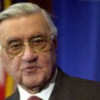Adnan Pachachi

Adnan Pachachi
Adnan al-Pachachi or Adnan Muzahim Ameen al-Pachachiis a veteran Iraqi politician and diplomat. Pachachi was Iraq's Permanent Representative to the United Nations from 1959 to 1965 and foreign minister of Iraq from 1965 to 1967 during the Six-Day War with Israel; he again served as permanent representative to the UN from 1967 to 1969. After 1971, he spent a long period in exile. Since the 2003 invasion of Iraq, Pachachi has been an important figure in Iraqi politics, often described...
NationalityIraqi
ProfessionPolitician
Date of Birth14 May 1923
CountryIraq
We are on the verge of taking a major step in our political path.
This contest between the secular and religious visions of government is really the main choice to be made. It won't be decided in one election, but it is a basic choice between an open and progressive Iraq and one that is backward and continues to fall behind.
Until and unless we could disband these militias, this country won't be able to function properly.
An apology for the actions of some troops who, of course, are not representative of the majority of the armed forces here, I think that would have been useful and it would have helped to some extent.
If the security forces continue to be dominated as they are now by political groups or sects, then the people won't trust in them - and the result will be civil war or fragmentation of the country.
It won't be a question of how well-trained or well-equipped the army is but one of the authority it serves.
I think the Shiites want a theocracy.
Everybody seems to be imprisoned in their own sectarian or political affiliations. They don't seem to be able to rise above these things.
I think people are rapidly losing confidence in the political class, and I don't blame them.
About Tariq Aziz, I don't know when and if a trial will be held,
This polarization has to end. Otherwise it could lead to disaster for the country.
This bloc, if it comes together will have real weight.
It is in our interest to expedite the whole process.
He seemed to be unrepentant, and there was no remorse or even sometimes there was a hint of defiance. Sometimes, he wasn't very coherent.